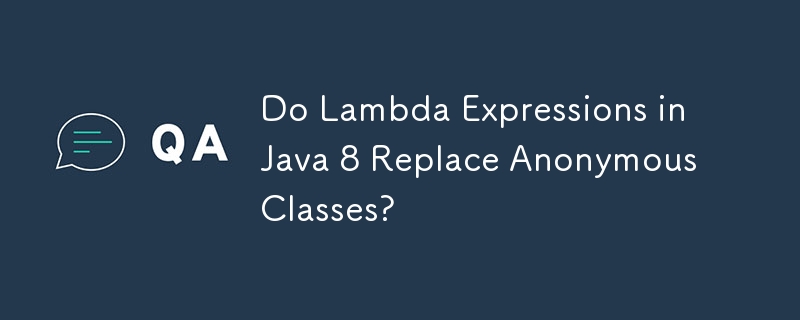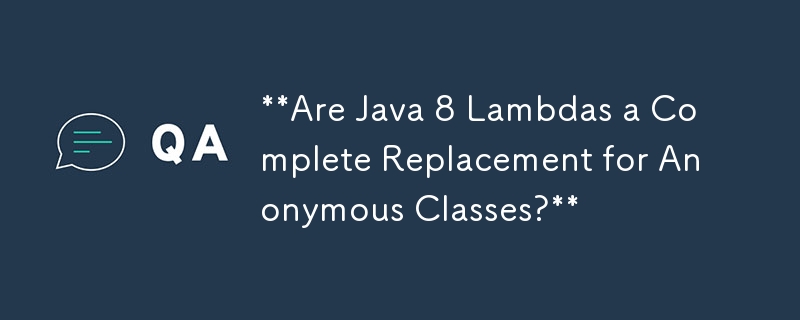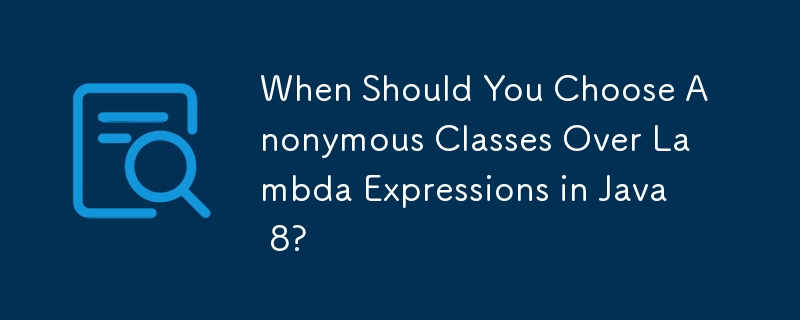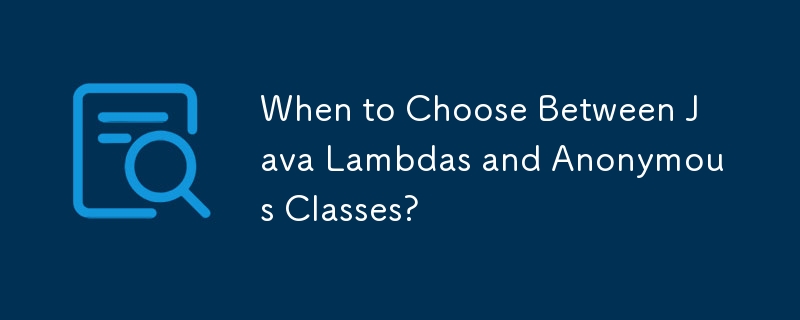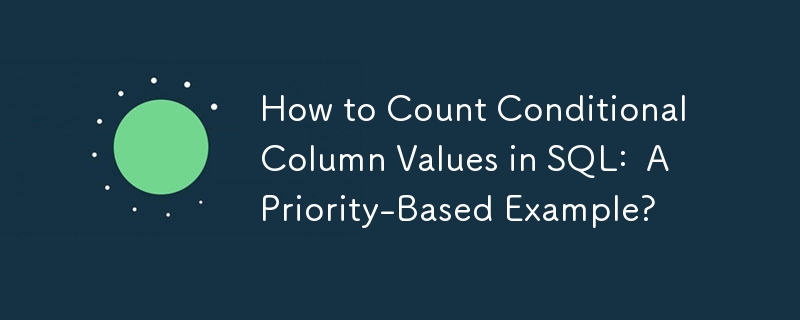Found a total of 10000 related content

Difference between interface and abstract class in Java.
Article Introduction:Useabstractclassestosharecodeanddefinenon-staticfields,whileinterfacesdefinecontractsandsupportmultipleinheritance.1.Abstractclassesallowbothabstractandconcretemethods,interfacesonlyabstract(beforeJava8)ordefault/staticmethods(Java8 ).2.Abstractclass
2025-07-06
comment 0
930

Implementing Lambda Expressions in Java.
Article Introduction:Java8's Lambda expressions are implemented by simplifying anonymous internal classes, making the code more concise. 1. The basic syntax is (parameter list)->{ method body}, such as Runnabler=()->System.out.println("Hello"); 2. Commonly used for collection traversal and sorting, such as names.forEach(name->System.out.println(name)) and numbers.sort((a,b)->a.compareTo(b)); 3. It can only be used for functional interfaces, that is, interfaces with only one abstract method, such as Runnable
2025-07-06
comment 0
493

Using the new Java Date and Time API (java.time).
Article Introduction:Java8's java.time package provides thread-safe and clear design date and time processing methods. Get the current date and time available LocalDateTime.now() or ZonedDateTime.now(ZoneId.of("Asia/Shanghai")); 1. Use DateTimeFormatter to format, such as ISO_DATE or custom format; 2. The parsing needs to ensure that the string and the format are strictly matched; 3. Addition and subtraction operations are implemented through plusXxx()/minusXxx(); 4. Use isBefore()/isAfter() for comparison; 5. Use time zone conversion
2025-07-06
comment 0
586

How to use Java Stream collect() with groupingBy?
Article Introduction:The groupingBy collector of Stream in Java8 supports multiple grouping methods. ① Group by field: If you group by city, use Collectors.groupingBy(Person::getCity); ② Multi-level grouping: If you group by city first and then by age, use nested groupingBy; ③ Customize downstream operations: If you use Collectors.counting() to count the quantity, use Collectors.averagingInt() to calculate the average; ④ After grouping, merge data: If you splice the names into strings, use Collectors.mapping() to cooperate with Collectors.joini
2025-07-10
comment 0
443

What is an anonymous inner class?
Article Introduction:Anonymous internal classes are used in Java to create subclasses or implement interfaces on the fly, and are often used to override methods to achieve specific purposes, such as event handling in GUI applications. Its syntax form is a new interface or class that directly defines the class body, and requires that the accessed local variables must be final or equivalent immutable. Although they are convenient, they should not be overused. Especially when the logic is complex, they can be replaced by Java8's Lambda expressions.
2025-07-07
comment 0
162

Explain the new Date Time API?
Article Introduction:Java8's new Date-Time API solves problems such as insecure threads and chaotic designs. It has the advantages of clear structure, powerful functions and intuitive use. 1. Get the current date and time with LocalDate (year, month, day), LocalTime (hour, minute, second), LocalDateTime (year, month, day, time, without time zone), and the object is immutable and suitable for multi-threading; 2. Get the ZonedDateTime by processing time with time zone, and supports the current time zone time and conversion to other time zones by ZoneId; 3. Use DateTimeFormatter to format and parse dates, which is thread-safe and clear, and supports ISO and custom formats; 4. Support chained tune
2025-07-03
comment 0
409

Exploring New Features Introduced in Java 8
Article Introduction:The core new features of Java8 include Lambda expressions, StreamAPI, and default methods. 1. Lambda expressions simplify the implementation of functional interfaces, making the code more concise, but it should be noted that it is only applicable to functional interfaces and should not be too complicated; 2. StreamAPI provides declarative data processing methods to improve collection operation efficiency, but should avoid using them on small amounts of data and reduce side effects; 3. The default method allows interfaces to define methods to implement, enhance backward compatibility, but cannot access class state and need to solve method conflict problems. The rational use of these features can improve code quality and development efficiency.
2025-07-11
comment 0
515

How to iterate over a Map in Java?
Article Introduction:There are three common methods to traverse Map in Java: 1. Use entrySet to obtain keys and values at the same time, which is suitable for most scenarios; 2. Use keySet or values to traverse keys or values respectively; 3. Use Java8's forEach to simplify the code structure. entrySet returns a Set set containing all key-value pairs, and each loop gets the Map.Entry object, suitable for frequent access to keys and values; if only keys or values are required, you can call keySet() or values() respectively, or you can get the value through map.get(key) when traversing the keys; Java 8 can use forEach((key,value)->
2025-07-13
comment 0
913

Using Predicates and Consumers in Java 8 Functional Programming
Article Introduction:In Java8, Predicate is used for conditional judgment, accepting parameters and returning boolean values, which are often used to filter data, such as filtering elements that meet the conditions in combination with filter() method; it can encapsulate complex logic and support combination operations of and(), or(), and negate(). Consumer is used to perform operations without return values. It is commonly used when forEach traversing the collection, such as printing or logging; it supports multiple operations in sequence through andThen() chain call. It should avoid too many side effects when using it. It is recommended to use references to improve the simplicity of the code and combine it with StreamAPI to play a greater role.
2025-07-08
comment 0
947

How to create threads in Java programming?
Article Introduction:There are two main ways to create threads in Java: inherit the Thread class and implement the Runnable interface. 1. To inherit the Thread class, you need to define a subclass and overwrite the run() method, and start a thread through start(), which is suitable for simple tasks but is limited by the Java single inheritance mechanism; 2. To implement the Runnable interface to separate tasks from threads, run Runnable instances through Thread, support more flexible design and can be used in combination with thread pools; in addition, Java8 can also use Lambda expressions to simplify the writing of one-time tasks. Be careful not to call run() directly, avoid repeated starts, reasonably naming threads, and understand the priority scheduling mechanism.
2025-07-05
comment 0
629

Key Differences Between Java Interfaces and Abstract Classes
Article Introduction:Selecting an interface or an abstract class in Java depends on design requirements. The interface defines the behavior contract and supports multiple inheritance, which is suitable for the general ability of unrelated classes; abstract classes provide shared logic and fields, which is suitable for closely related class inheritance. 1. The interface is used to define method contracts (the default and static methods can be included after Java 8), and the abstract class can contain abstract and specific methods and instance variables. 2. Classes can implement multiple interfaces but can only inherit one abstract class, which is suitable for scenarios where multiple behaviors need to be mixed. 3. The interface field defaults to public static final, and the method defaults to public; the abstract class supports various access modifiers and non-static non-final fields. 4. The Java8 interface supports default methods to facilitate API evolution without breaking the present
2025-07-06
comment 0
735
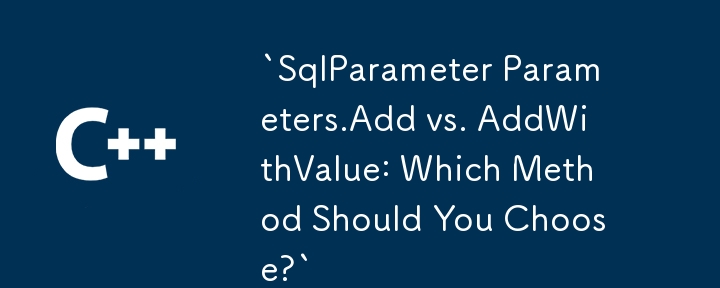

Dave The Diver: How To Catch Spider Crabs
Article Introduction:In Dave The Diver, there are some creatures that are not easy to catch. Or, catch alive that is. The spider crab is one of those very species, making it seem like the only way to bring these crustaceans back up to land is to viciously crack them up w
2025-01-10
comment 0
793
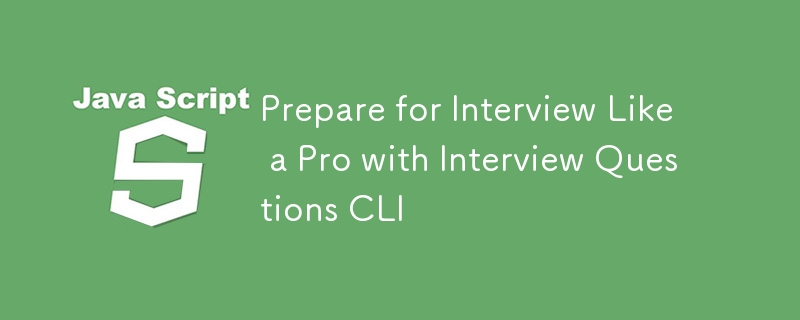
Prepare for Interview Like a Pro with Interview Questions CLI
Article Introduction:Prepare for Interview Like a Pro with Interview Questions CLI
What is the Interview Questions CLI?
The Interview Questions CLI is a command-line tool designed for JavaScript learners and developers who want to enhance their interview
2025-01-10
comment 0
1421

